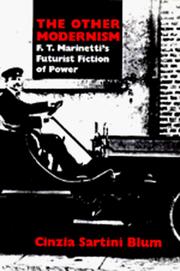| Listing 1 - 2 of 2 |
Sort by
|

ISBN: 0520916271 0585263973 9780520916272 9780585263977 0520200489 0520200497 9780520200487 9780520200494 Year: 1996 Publisher: Berkeley ; Los Angeles ; London University of California Press
Abstract | Keywords | Export | Availability | Bookmark
 Loading...
Loading...Choose an application
- Reference Manager
- EndNote
- RefWorks (Direct export to RefWorks)
Drawing on recent feminist and psychoanalytic criticism, Cinzia Sartini Blum provides the first analysis of the rhetoric, politics, and psychology of gender in the avant-garde writings of the Italian Futurist F.T. Marinetti. Her book explores the relations between the seemingly unrelated goals of Italian Futurism: technical revolution, espousal of violence, avowed misogyny, and rejection of literary tradition. Blum argues for the centrality of the rhetoric of gender in Marinetti's work. She also investigates a diverse array of his futurist textual practices that range from formal experimentation with "words in freedom" to nationalist manifestos that advocate intervention in World War I and anticipate subsequent fascist rhetoric of power and virility. A major contribution to the study of the twentieth-century avant-garde and the first full-length study of Marinetti in English, The Other Modernism will interest all those concerned with twentieth-century literature, culture, and society and the problem of modern subjectivity.
Futurism (Literary movement) --- Italian Literature --- Romance Literatures --- Languages & Literatures --- Marinetti, F. T., --- Marinetti, F. T. --- Criticism and interpretation. --- Marinetti, Filippo Tommaso --- Criticism and interpretation --- Italy --- Marinetti, Filippo Tommaso, - 1876-1944 - Criticism and interpretation. --- Futurism (Literary movement) - Italy. --- analysis of avant garde writings. --- avowed misogyny. --- centrality of rhetoric of gender. --- espousal of violence. --- feminist and psychoanalytic criticism. --- formal experimentation to nationalist manifestos. --- futurist textual practices. --- italian futurism. --- italian futurist. --- rejection of literary tradition. --- technical revolution. --- unrelated goals of italian futurism.
Book
ISBN: 1526102005 9781526102003 0719090539 9780719090530 1526116871 9781526116871 Year: 2013 Publisher: Manchester : Manchester University Press,
Abstract | Keywords | Export | Availability | Bookmark
 Loading...
Loading...Choose an application
- Reference Manager
- EndNote
- RefWorks (Direct export to RefWorks)
In 1909 the Italian poet Filippo Tommaso Marinetti's Founding Manifesto of Futurism was published on the front page of Le Figaro. Between 1909 and 1912 the Futurists published over thirty manifestos, celebrating speed and danger, glorifying war and technology, and advocating political and artistic revolution. This collection of essays aims to reassess the activities of the Italian Futurist movement from an international and interdisciplinary perspective, focusing on its activities and legacies in the field of poetry, painting, sculpture, theatre, cinema, advertising and politics. The essays offer exciting new readings in gender politics, aesthetics, historiography, intermediality and interdisciplinarity. They explore the works of major players of the movement as well as its lesser-known figures, and the often critical impact of Futurism on contemporary or later avant-garde movements such as Cubism, Dada, and Vorticism. The publication will be of interest to scholars and students of European art, literature and cultural history, as well as to the informed general public.
Futurism (Art) --- Futurism (Literary movement) --- ART / History / General. --- Futurism (Art). --- Futurism (Literary movement). --- LITERARY CRITICISM --- European --- Italian. --- Italy. --- Literature --- Literary Studies: C 1800 To C 1900 --- LITERARY CRITICISM / Modern / 19th Century / Western --- Italy --- Dada art. --- Fernand Leger. --- Filippo Tommaso Marinetti. --- Florentine futurism. --- Italian futurist poetry. --- La cucina futurista. --- La noce. --- Le Figaro. --- Manifesto del tattilismo. --- Pierre Albert-Birot. --- Robert Delaunay. --- Umberto Boccioni. --- avant-garde advertisement. --- avant-garde historiography. --- futurist canons. --- futurist culture. --- futurist manifesto. --- simultaneity. --- technological war. --- avant-garde. --- futurisme. --- vorticisme. --- Marinetti, Filippo Tommaso. --- Albert-Birot, Pierre. --- Boccioni, Umberto. --- Delaunay, Robert. --- Léger, Fernand. --- Gramsci, Antonio. --- Buvoli, Luca. --- 20ste eeuw.
| Listing 1 - 2 of 2 |
Sort by
|

 Search
Search Feedback
Feedback About UniCat
About UniCat  Help
Help News
News